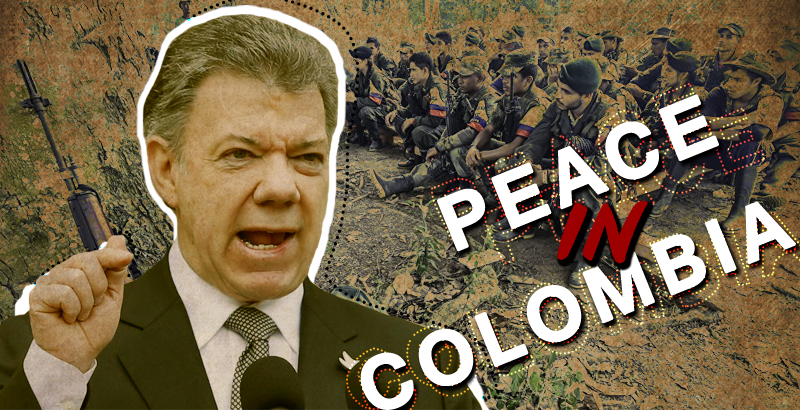
Written by Daniel Edgar exclusively for SouthFront
There have been several significant developments in Colombia over the last month. There has been steady progress in the negotiations between the Government and the FARC, and it seems that a final agreement may be reached in the near future. One of the main outstanding issues, the method by which a final agreement will be approved or rejected by the Colombian people, has been resolved following the commitment of both parties to the negotiations to abide by the decision of the Constitutional Court on the validity of a proposed plebiscite (the method preferred by the Government – the FARC had long insisted on the convocation of a more wide ranging Constitutional Assembly). The Constitutional Court recently held that there is no constitutional obstacle to holding a plebiscite so that the Colombian people can ratify or reject a final agreement.
However, the rapid pace of negotiations and goodwill being demonstrated by both sides have not had a positive effect on the discussions between the Government and the other insurgent group, the ELN. After the formal announcement of negotiations several months ago, no progress has been made and it appears that the sides have not even met to further elaborate an agenda and format for negotiations. The leadership of the ELN published a statement last week denouncing the Government’s apparent unwillingness to initiate substantive negotiations, expressing doubts over the possibility of negotiating an end to the social and armed conflict, and reiterating the right of the people to armed rebellion if a government lacks popular legitimacy.
The stalemate poses a substantial complication to the efforts to reach a definitive end to the social and armed conflict, raising the possibility that FARC guerrillas wary of the intentions of the Government (and other powerful groups) and the prospects for substantive change in the political and institutional environment (or opposed to the peace process for other reasons) may simply join the ELN and continue the armed insurgency (several commanders of one of the guerrilla fronts were recently expelled from the FARC after stating their intention to refuse to disarm and demobilize). This was the fate of prolonged peace negotiations that took place between insurgent groups and the Colombian Government in the 1980s and 1990s; while some groups demobilized, others continued the armed rebellion. Similar developments marred the official disarmament and reintegration into society of the paramilitary groups (widely considered to be allies of the State and other sectors of the Establishment) between 2003 and 2006.
Nonetheless, it is possible that the stalemate in negotiations with the ELN will not end up being a decisive factor in whether the country can move beyond the social and armed conflict. Much depends on whether the Government can fulfil the commitments it has made with the FARC as well as with the representatives of social movements and civil society organizations following several waves of mass protest and mobilization (described in earlier articles). These include commitments: to do everything possible to open politics and State institutions to participation by all Colombians, and ending the systematic campaigns of State persecution and terrorism that have traditionally been waged by the ruling classes against all independent and leftist political forces and social movements opposed to the status quo of political and economic exclusion (signifying the complete dismantling of the remnants of the paramilitary groups and other ‘dark forces’ responsible for ongoing threats and political and economic violence, both within and beyond State institutions, and the elaboration of a comprehensive strategy to identify and prosecute the intellectual and material authors and beneficiaries of the violence and persecution as well as to provide truth, justice and reparations to victims); to conduct a program of wide-ranging agrarian reforms to guarantee the property rights of small-scale farmers and rural, Afro-Colombian and Indigenous communities and roll back the constant encroachments and forced displacements they have suffered from landlords, agribusiness, and megaprojects (often to the benefit of ‘foreign investors’, who rarely seem to have difficulties operating in regions and localities where Colombian farmers and rural and remote communities face constant threats, forced displacements, selective assassinations and massacres); to conduct a comprehensive review of all mining and exploration licences and permits to ensure that they have complied with all legal and administrative requirements, in particular that they have been granted with the prior informed consent of local communities and landowners.
If the Government and the FARC can successfully conclude and implement a final agreement, and the Government fulfils the commitments it has assumed in negotiations with the representatives of the social sectors and movements during successive mass mobilizations throughout the country, the ELN will have no choice but to accept that their concerns were unfounded and renounce the path of armed rebellion. Failing that, they will have very little or no support base amongst the Colombian people. If however the Government will not or cannot fulfil the commitments it has made, the country faces the prospect of interminable mass protests, mobilizations, strikes and blockades by a wide range of increasingly organized and determined social movements and sectors of society for the foreseeable future. If this occurs significant support for the path of armed rebellion is likely to continue, whether or not the FARC and the ELN disarm and demobilize.
Of course, successful implementation of the agreements reached up to now will be an enormous challenge for all concerned, not just those sectors and groups party to the agreements but for Colombian society as a whole. Nothing can be taken for granted, and the pitfalls and obstacles are numerous and deeply entrenched both within Colombia as well as in its official and unofficial international relationships. These facts are recognized by all. Moreover, many uncontrollable external factors and actors are capable of undermining or destroying the fragile peace process and the efforts to move beyond the social and armed conflict.




Venezuela went bankrupt and could not fund FARC. Venezuela will give Russia fleas.